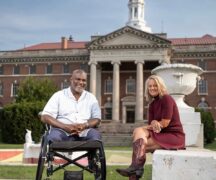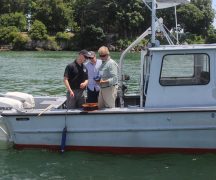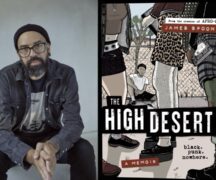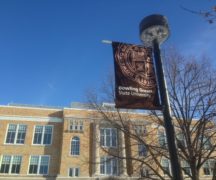By DAVID DUPONT
BG Independent News
The NCAA thinks there’s something special about the We Are One Team, a student-driven project that uses sports to promote diversity, acceptance and inclusion at Bowling Green State University.
The NCAA thinks the project is so special that it is giving WA1T its Award for Diversity and Inclusion.
President Mary Ellen Mazey along with founder Yannick Kluch will travel to Nashville in January to accept the honor.
“BGSU has long history of this,’ Mazey said. “This is really what we’re all about and have been for many years.”
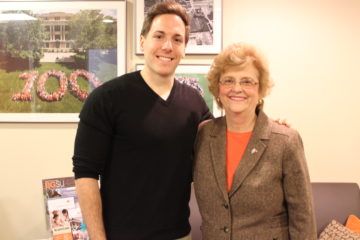
Yannick Kluch and President Mary Ellen Mazey
Support for diversity is written into the Falcon Creed, which also originated with students. That’s evident, she said, in the president’s office where an African American president served for 16 years followed by two female presidents as well as in the student body which is about 23 percent people of color and international.
It’s demonstrated, she said, in Not In Our Town and It’s on Us, all projects with which WA1T collaborates.
Kluch said that the project grew from his own experience as an international student. He came here in 2012 to study as a graduate student in Popular Culture from his native Hamburg, Germany. He admits he had some reservations about coming from a metropolitan city to “small town Ohio.” But he found his place, in part thanks to sports.
Early on he attended a football game, American football, not the soccer he played back home. He didn’t know anything about the game, he just cheered when everyone else did. That’s where made his first Bowling Green friends.
Now studying for a doctorate in Media and Communication, his interest in diversity led him to think about how “the emotional power of sports” could be harnessed to bring people together.
Last January he and two other graduate students in Media and Communication, Chelsea Kannert and Christian Thompson, started discussions about how to do that. WA1T was launched in September.
“It has definitely been a crazy ride,” Kluch said. “In our short amount of time we’ve definitely had an impact. The NCAA award is definitely a sign we’re doing good things on campus.”
They’ve sponsored an event that brought in representatives from the Muhammad Ali center. They sponsored a talk by BGSU transgender athlete Brent Durah. After the packed event Durah said he never thought so many people would be interested in his story.
While the program works with all teams, those that stepped up early with strong support were swimming and diving, gymnastics, and the men’s and women’s soccer teams.
The program has partnered with 25 other organizations on campus. “From where I sit this is what I want,” Mazey said. “What makes it so good it came up from the students. … We say it’s all about the students. There’s a supportive environment for students that I haven’t seen on any of my other four campuses.”
“I don’t think I would have had as much success with this on any other campus,” Kluch said. “People asked me why I love BGSU so much…. You have to be here. You’ve just got to see the chemistry on campus.”
In today’s world, brought closer together by media, diversity on campus is crucial, she said.
Mazey said she learned her first lessons about diversity growing up in a resort town in West Virginia. The basketball team was all African-American, she said. All but one of her fellow cheerleaders were white.
At the end of the season, a restaurant in the African-American section of town hosted banquet for the team. Another white cheerleader said she wasn’t going. Mazey talked to her mother who worked in the kitchen at the resort. Of course, you’ll go, Mazey’s mother told her. “Those are my friends. I work with them every day. … That taught me early on the about diversity.”
Now she leads a university that’s being honored as a leader in promoting diversity and inclusion.
Kluch said the goals for WA1T are to continue its efforts including talk by professional athlete who supports LBGT issues. The project will also host a 5K with a twist.
On the run, one team member will start and others can join along the way to run or walk based on their abilities. Kluch said he’s been contacted by Special Olympics about participating.
He also wants to find ways that football, basketball and hockey players can become more involved. Their travel and year-round training poses particular challenges to their participation. But he plans to pair up athletes with international students. The student athletes will share their passion for sports with international students. Those two groups, the WA1T application to the NCAA says, are two of the most isolated on campus.
Kluch also wants to make sure WA1T has a succession plan, so it will continue after he’s gone.
The organizers want the initiative to inspire other organizations on other campuses. Recognition by the NCAA is sure to brighten the prospects of that goal.


